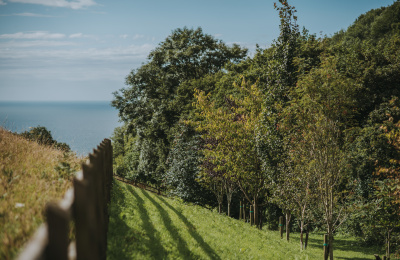A scheme that saw 3,000 young hedge plants and trees planted by The Donkey Sanctuary last winter is going from strength to strength with hundreds more being added to the total this year.
The initiative, which began in 2021 to help reduce flooding and improve water quality in East Devon’s Otter Valley, has continued with our staff and volunteers planting a mixture of native species to help restore and create new hedgerows at our Woods Farm site near Sidmouth.
This year, two organisations – Saving Devon’s Treescapes and The Woodland Trust – are providing us with a further 1,000 young hedge plants and trees, which will be planted as part of Sidmouth’s 14,000 Trees project. This project is a partnership between Sidmouth Arboretum and Sidmouth Town Council to plant a tree for each person living in the Sid valley.
The trees and hedge plants at The Donkey Sanctuary, which include field maple, hawthorn, downy and silver birch, beech, small-leaved lime, grey willow and donkey favourite hazel, not only benefit native wildlife and the resident donkeys but also help improve soil health and reduce water run off at the site.
The sanctuary at Woods Farm, which is near our international headquarters in Sidmouth, is home to around 450 donkeys and a haven to a whole host of native wildlife species.
The new hedgerows and trees will provide additional food, shelter and nesting sites for wildlife, as well as offering connectivity across the landscape, allowing animals to move between areas of suitable habitat.
The donkeys love to eat woody shrubs and prickly vegetation, so the hedges will give them more to browse on, while providing them with shade and shelter from the elements.
In addition to the planting of trees and hedgerows, leaky dams have been repaired and new ones added this year to help slow the flow of water down the steep hillsides.
The creation of dams using felled scrub acts as a barrier to the water flow, preventing the loss of soil and silt. They allow water to be absorbed and recycled by surrounding vegetation and released slowly as it leaks through the dam.
Pascal Bisson, Ecology and Conservation Apprentice at The Donkey Sanctuary, said: “The new hedges will enhance our land all year round. In summer, they provide our donkeys with shade and woody vegetation to browse.
“Hedge species such as the blackthorn flowering in spring means a welcome source of nectar and pollen for bees, while their berries feed our winter thrushes. They also provide more suitable habitat for rare farmland birds and the threatened brown hairstreak butterfly.”
Despite last summer’s incredibly hot weather, the majority of the previously planted trees survived, and for the few that didn’t, replacements were made from the sanctuary’s pop-up tree nursery at the Sidmouth site.
By the end of this winter, our Ecology and Conservation team and their band of volunteers are expected to have planted 1,000 more trees and hedge plants, totalling 4,000 at Woods Farm. These are in addition to hundreds more that have been planted at other outlying farms including Brookfield Farm near Honiton, where our donkey hospital is located.
Ed Dolphin, Treasurer of Sidmouth Arboretum, said: “We are absolutely delighted to be working with The Donkey Sanctuary to plant a wildlife corridor of nearly 1,000 young native trees at Woods Farm.
“The corridor will grow into a highway for all sorts of small creatures, while also providing a shelter belt for the donkeys, and go some way to attenuating run-off from the steep slope in heavy rain – a triple win.”
The newly planted trees and hedges will not only help prevent flooding and soil erosion and replace the ash trees, which the county is sadly losing due to Ash dieback disease. They will provide a safe habitat and food for our native wildlife, enrichment and shelter for the resident donkeys, and benefit everyone by creating a green legacy for many years to come.


